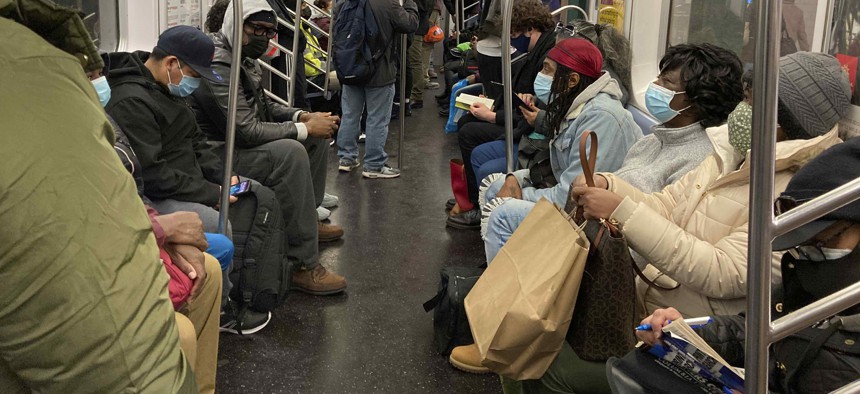Two Mayors Envision the Future of Public Transit

People ride on a subway train in New York City in December 2020. STRF/STAR MAX/IPx 2020

Connecting state and local government leaders
COMMENTARY | The mayors of Kansas City, Missouri and Richmond, Virginia offer their thoughts on how to rebuild public transit in the wake of the coronavirus pandemic.
As America experiences its largest surge of Covid-19 cases, policymakers face a new wave of challenges not only in protecting public health but also addressing the myriad economic issues that the virus has caused. While the immediate health and safety of residents is paramount, we cannot ignore the simmering crises that for years have harmed our most vulnerable communities and been magnified by the pandemic. One of these challenges is this nation’s lack of an equitable transit and mobility infrastructure.
The average American spends more on transportation than on food or healthcare, and unequal investments result in growing inequities. This year has highlighted how mass transit serves as a vital means of connecting underserved communities to jobs and essential services. Census data reveals essential workers represent 36% of regular transit ridership. When essential workers are transit-dependent, it means our economies are transit-dependent.
As local leaders, we have witnessed firsthand the repercussions of poorly designed infrastructure. It can divide or even disenfranchise an entire community. But public transit systems rooted in intentional place-making and equity can mitigate disparities by boosting economic mobility, shrinking the community’s carbon footprint, and reducing congestion on roads.
In Kansas City, Mayor Lucas has pioneered a first-of-its-kind zero-fare transit service, a move which pre-Covid projections show will save $2,100 per year for a single parent using buses to commute and inject $13 million to $18 million into the regional economy. In Richmond, Mayor Stoney has established an Office of Equitable Transit and Mobility, which will examine the city’s infrastructure to ensure it meets the needs of every resident while actively working to lift up underserved communities. During the pandemic, the Greater Richmond Transit Corporation shifted to a zero-fare structure, and Mayor Stoney hopes to make that change permanent. Meanwhile, in West Sacramento, Mayor Christopher Cabaldon partnered with Via to offer on-demand transportation, filling gaps in transit infrastructure by bringing door-to-door service to seniors and others who struggle with mobility.
The benefits of popular, well-designed transit go far beyond shorter wait times and decreased congestion. Boosting usage is a key factor in building stronger economies with more opportunities for mobility. In the wake of the pandemic, questions of public trust, budgetary restrictions and lingering equity issues threaten disaster while also creating opportunity for those bold enough to act.
While the recent federal coronavirus relief package dedicates $14 billion to transit agencies that will help stabilize their budgets, more will be required to change the tide on public transit. But we shouldn’t rely solely on federal intervention. Our colleagues in statehouses and city halls nationwide must take the opportunity presented by this crisis to give equitable transportation policies and practices the attention they deserve.
The recently released Mass Transit Crisis Strategy by the NewDEAL Forum’s Renewing America Task Force provides a framework. (We are both members of the Forum’s sister organization, the NewDEAL, a national network of state and local leaders promoting innovative approaches to governing.) Local leaders often set ambitious goals for more efficient and equitable transportation, but too often these aspirations are stymied by top-down regulation, cost concerns, and the enormity of a task that can require reimagining large sections of our built environment. Leaders should keep several guiding principles in mind when moving forward:
- When making any land-use decision, consider transportation. Residential and commercial construction should maximize travel via public transportation and pedestrian/bike access. No more highways that divide communities and make neighborhoods (usually dominated by people of color) less desirable. We must balance our goal of easy automobile access in and around our communities with the need for a better system that serves everyone.
- Keep riders’ trust. Fears about coronavirus infections occurring while using public transit systems have been persistent. City leaders will need to rebuild people’s trust in the safety of public transit. They can start by recognizing that a series of international studies have been “unable to tie any group of [coronavirus] outbreaks to rail lines or city public transportation.”
- Make comprehensive data collection a priority. Use GIS-based mapping and data tools to accurately evaluate the effectiveness of systems and how efficiently they connect people to services.
- Maximize the impact of limited funding. The budget and ridership projections are grim: annual shortfalls of $26 billion to $40 billion and a 70% to 90% loss in ridership. Hard choices will need to be made. To start, cities can cut programs that aren’t expanding access and focus on fewer, higher quality bus and rail lines that connect to the heart of the community. A hub-and-spoke system where several types of service are blended is the right approach for many cities.
Most importantly for cities is the consideration of equitable access in all transit decisions. Research shows 60% of transit riders are people of color. The systems leaders build should lift up these communities by providing a safe, affordable, sanitary, and reliable connection to economic opportunities. Through visible investment in transit, give riders the dignity they deserve.
As America rebuilds from Covid-19, state and local leaders have the opportunity to inspire an essential reimagining of the impacts public transit can have on all of our lives, whether you are a regular rider or not.
Quinton Lucas is the mayor of Kansas City, Missouri and vice chair for transit on the U.S. Conference of Mayors Committee on Transportation and Communications. Levar Stoney is the mayor of Richmond, Virginia.

NEXT STORY: How government can rebuild digital infrastructure and support diversity and inclusion




